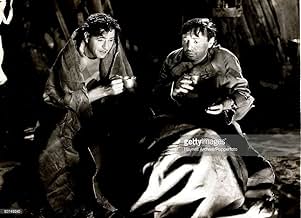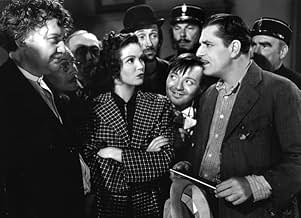After saving a tramp from suicide, a millionaire takes his clothing and disappears. Word is out that he will give a million francs to anyone who is kind to a tramp.After saving a tramp from suicide, a millionaire takes his clothing and disappears. Word is out that he will give a million francs to anyone who is kind to a tramp.After saving a tramp from suicide, a millionaire takes his clothing and disappears. Word is out that he will give a million francs to anyone who is kind to a tramp.
Featured reviews
Warner Baxter plays a millionaire who is sad to discover that no one cares about him for anything but his money. This includes his butler (and he thought friend) of many years, as we see in one pathetic scene early on. He's drowning himself in pity on a yacht when he sees hobo Peter Lorre drowning himself in the ocean. So he jumps in and helps out. This leads to some soul-searching on Baxter's part and some wrong assumptions on Lorre's part, which sets up the movie's game of telephone screwball plot where the word gets out that a millionaire is disguising himself as a hobo and will give a million dollars to anyone who is kind to him.
I enjoyed this movie but I admit to being a little let-down it wasn't better than it is. Lorre is not in it much, for one thing. He's great when he's around but ultimately he's a minor character, screen time-wise. It's also not a particularly funny movie. Pleasant is a good word for it. The second half is weaker than the first. I would recommend you see it if you find the plot and cast interesting. After all my 6 might be your 7 or 8.
I enjoyed this movie but I admit to being a little let-down it wasn't better than it is. Lorre is not in it much, for one thing. He's great when he's around but ultimately he's a minor character, screen time-wise. It's also not a particularly funny movie. Pleasant is a good word for it. The second half is weaker than the first. I would recommend you see it if you find the plot and cast interesting. After all my 6 might be your 7 or 8.
This film starts out with great promise. Tony (Warner Baxter) is a wealthy man, out on his yacht, who suddenly becomes aware that everybody onboard is just nice to him because of his money. As he stands leaning over the railing of the yacht, pondering this fact, he notices a man yelling for help, apparently drowning in the ocean. His yells of man overboard are not heard, so he jumps in and rescues the man. The yacht is out of range, so he swims to shore with Louis (Peter Lorre) in tow.
They camp on the beach for the night, and Tony tells Louis that if he could find just one person who was nice to him and not expecting a payout that he would give that person one million francs (today one dollar = 5 francs). The next day Louis awakens and finds Tony gone but his clothes and money still there. He goes into town wearing Tony's clothes and spending Tony's money. This gets the attention of the police, where Louis tells the story of the rich man, incognito dressed like a tramp, who will give one million francs to anybody who does a good deed for him with no expectations of reward. Soon everybody is being nice to all of the hobos. Meanwhile, Tony has become friends with a woman in a circus who knows nothing about this . Complications ensue.
Now all of this sounds pretty good, but it just seems to bog down a bit after Tony and Louie separate. A 1930s Fox screwball comedy is a rarity, and there is a reason for that. This would have been even better and probably ringed a bit truer if it had been made over at Warner Brothers, retaining the natural performance of Baxter as the millionaire and Lorre as the impish tramp and maybe using some of Warners' great contract players to fill in the blanks.
Still, it is funny and like "My Man Godfrey" has something to say about how your pocketbook often dictates your treatment by your fellow man towards the end of the Great Depression. A rare message-comedy from Fox.
They camp on the beach for the night, and Tony tells Louis that if he could find just one person who was nice to him and not expecting a payout that he would give that person one million francs (today one dollar = 5 francs). The next day Louis awakens and finds Tony gone but his clothes and money still there. He goes into town wearing Tony's clothes and spending Tony's money. This gets the attention of the police, where Louis tells the story of the rich man, incognito dressed like a tramp, who will give one million francs to anybody who does a good deed for him with no expectations of reward. Soon everybody is being nice to all of the hobos. Meanwhile, Tony has become friends with a woman in a circus who knows nothing about this . Complications ensue.
Now all of this sounds pretty good, but it just seems to bog down a bit after Tony and Louie separate. A 1930s Fox screwball comedy is a rarity, and there is a reason for that. This would have been even better and probably ringed a bit truer if it had been made over at Warner Brothers, retaining the natural performance of Baxter as the millionaire and Lorre as the impish tramp and maybe using some of Warners' great contract players to fill in the blanks.
Still, it is funny and like "My Man Godfrey" has something to say about how your pocketbook often dictates your treatment by your fellow man towards the end of the Great Depression. A rare message-comedy from Fox.
An amiable, workmanlike farce that's like "My Man Godfrey" without the archness, this Hollywood studio product has an unusually European flavor, perhaps due to the number of newly arrived Holocaust refugee actors in its cast. Especially worth seeing for Peter Lorre's engaging turn as a kittenish hobo.
20th Century-Fox did this Hollywood remake of a 1935 Italian film of the same translated title, the setting switched to the South of France, featuring a cast filled with contract players led by Warner Baxter ("The Prisoner of Shark Island"). His character, Tony Newlander, is the millionaire tiring of the sycophants around him, none of whom he can rely on as a trusted friend, who rescues a drowning man known as Louie 'The Dope' Monteau (Peter Lorre), a homeless derelict. Tony would be happy just to find one person who could befriend him without the promise of monetary gain, leaving Louie a million dollars for his troubles. Once the newspapers publish a story claiming that a millionaire is masquerading as a bum, a fortune awaiting the person who shows him any kindness, the entire city is quickly overrun with derelicts looking for handouts, while Tony finds himself falling for an impoverished circus performer (Marjorie Weaver) with a trained chimp named Darwin, who excels at judo and cigarette smoking. Amidst the Moto series, Peter Lorre thoroughly enjoys this comic change of pace, joined in mischief during the latter stages by John Carradine's Kopelpeck, resplendent in top hat and cane. Among the many familiar faces are Fritz Feld, Jean Hersholt as a clown, and Frank Reicher as the Prefect of Police, who himself takes in a bum off the street and ends up getting robbed.
For some strange Hollywood reason, the lovely, talented, adorable Marjorie Weaver had only about 45 credits -- despite the fact she stole this movie and many if not most of the others she played in.
Watching her here, in "I'll Give a Million," one has to be just grabbed by her gorgeous eyes, first, then by her bubbly personality, and I was really taken by her speech: She is a native of Tennessee, retaining the charm of the Southern belle.
Warner Baxter is the nominal star and here he gives one of his best casual performances. He plays the put-upon millionaire quite believably.
Peter Lorre gives a very different portrayal for him and is charming and likable, proving that he had an extraordinary range as an actor.
Jean Hersholt is mostly hidden by his role, as is John Carradine, as a rather flamboyant tramp.
Several exotic players give performances ranging from understated to over the top, but overall are quite watchable and enjoyable.
"I'll Give a Million" is fun, with settings ranging from a millionaire's yacht to a circus to the police station. I recommend it, and there is a quite good print at YouTube.
Watching her here, in "I'll Give a Million," one has to be just grabbed by her gorgeous eyes, first, then by her bubbly personality, and I was really taken by her speech: She is a native of Tennessee, retaining the charm of the Southern belle.
Warner Baxter is the nominal star and here he gives one of his best casual performances. He plays the put-upon millionaire quite believably.
Peter Lorre gives a very different portrayal for him and is charming and likable, proving that he had an extraordinary range as an actor.
Jean Hersholt is mostly hidden by his role, as is John Carradine, as a rather flamboyant tramp.
Several exotic players give performances ranging from understated to over the top, but overall are quite watchable and enjoyable.
"I'll Give a Million" is fun, with settings ranging from a millionaire's yacht to a circus to the police station. I recommend it, and there is a quite good print at YouTube.
Did you know
- Trivia"I'll Give a Million" was based on a 1936 film of the same name with Vittorio De Sica, whom Fox unsuccessfully tried to recruit for this remake.
- GoofsWarner Baxter was 5'11", Peter Lorre was 5'3", yet there exchanged clothing fit each other perfectly.
- ConnectionsRemake of Je donnerai un million (1935)
Details
- Runtime
- 1h 10m(70 min)
- Color
- Aspect ratio
- 1.37 : 1
Contribute to this page
Suggest an edit or add missing content



































